I argued, contra
, that apartheid was bad for South Africa. Now says, actually, it was good. I posted already today about a different topic but I want to give Laird the dignity of being humiliated in article form. I shall take his points in order.Mauritius
Stone writes:
Note that only about 3% of Botswana is white, and about 2% of Mauritius, and under 1% of Eswatini. It turns out that African countries really can have economic growth even without a white apartheid regime!
The majority of the Mauritian population are not black Africans. They are Indians. Mauritius was an uninhabited island prior to its discovery by Europeans. The majority of the Mauritian population is descended from Indian workers who went to work there in the 18th and 19th centuries. Richard Lynn estimated the average IQ of Mauritians at 89, (compared to 64 for Mozambique). The fact that Mauritius is the best-performing country in Stone’s sample is a point in favor of thesis that African populations cannot competently govern themselves, not against it.
Mauritius is an African country:
It’s on the same plate as east Africa.
What
is surly about is that Mauritius is not majority black. That’s true. But I said African, not black. In the best national IQ datasets I have on hand, it has an estimated national IQ of 86. Here’s IQ vs. GDP per capita in the region:You can see the IQ-GDP per capita correlations are null in 1950 and 1970. They are positive in 2022, but only because of Mauritius (area highlighted in the box). So does IQ predict growth rates?
Basically no. Within this region, national IQs tell us essentially nothing about economic growth rates. So it doesn’t make sense to say “Well of course Mauritius grew, IQ!” since we don’t actually observe a general IQ-growth correlation in southern Africa. Laird is wrong.
Botswana
Having tried and failed to kick Mauritius out of the sample,
now turns to Botswana. He claims:2. Botswana did not have racial Apartheid laws, but the black majority was not allowed to govern.
He cites a paper on the composition of their civil service…. in 1969. And even then, here’s the actual data:
Most of the bureaucracy was Tswana, and even in the senior ranks 42% were. I doubt the Tswana were actually incompetent, but even if they were, this supports my thesis that all that matters is a small number of competent elites. In Botswana, a 73%-Tswana civil service including 42% of the most elite ranks still managed to produce gangbusters economic growth and an orderly society! Amazing! That suggests that even a trivially small share of white elites should be enough, if what makes the system work is actually white elites.
Laird also says:
“Up until very recently Botswana had a fake democracy.”
O RLY?
Here’s some VDEM liberal democracy scores:
So generally liberal-minded scholars are of the view that Botswana was quite democratic 1965-2016, and has become less democratic lately. Contra
’s view that democracy worsened in 2024, outside observers who know a lot about Botswana think stuff got worse in 2016. Now sure, you can take these scores with a grain of salt, South Africa’s score is kind of amusing.There is, of course, a reason I think is plausible for why Mauritius and Botswana democratized early and well, for anybody who cares to learn it (update: and the same findings are replicated in a totally different context as well!). It is neither IQ nor British elites nor malaria, but a fascinating bit of institutional history.
And by the way, here’s Botswanan electoral participation over time:
Voter participation in Botswana is similar to what we observe in many Western democracies. This is clearly a normal, functioning democracy, not white-minority rule. Laird is wrong. Botswana is a functioning black African democracy with very good results, and it supports either the thesis that 1) black African democracy can produce good results or that 2) the number of white elites needed to generate good results is extremely small, and doesn’t require the institution of apartheid or really white minority rule in general. We’ll come back to 2).
Sanctions
He says:
Stone points out that South Africa’s growth rate was higher immediately after 1990 than immediately before. But no one denies this! The US State Department and allied countries put crippling sanctions on South Africa, demanding that South Africa adopt the US State Department’s ideology or face economic ruin. After South Africa submitted in 1990, the State Department and its allied lifted the sanctions. Supporters of Apartheid acknowledge that the economic damage caused by the sanctions was one of the reasons why South Africa capitulated.
aww, poh baby. Your country got sanctioned? Because of its domestic policy that was entirely within its control?
Gee, it’s almost like international trade outcomes are endogenous to domestic policy! Like, if a ruler pursues a nuclear weapons program! Or conquers neighboring countries! Or finances insurgents in neighboring countries! Other countries might react!
If your theory of politics is “An aggressive expansionist power actively pursuing nuclear and bioweapons as part of its campaign of racist conquest of its neighbors cannot have the consequences of its foreign policy counted against it for growth” then you have an idiotic theory of policy.
The warfare of the apartheid state was not ancillary! It was core to the logic of the state! So yes, sanctions, which were an endogenous part of the apartheid system, were part of why the apartheid system failed! That said, we shouldn’t overstate it: the real reason the apartheid system failed is because white South Africans were deeply internally divided and large shares of them did not actually support it. The Anglo-Boer divide is what killed apartheid, not sanctions.
Comparative Performance
He says:
Yes of course South Africa was richer than Zambia and Zimbabwe. The white share of South Africa’s population was higher, and whites had been there longer.
In Zambia and Zimbabwe and South Africa virtually 100% of the civil service was white. Like 5 seconds about Laird argued the secret to Botswana’s success was that 27% of their civil service was white!! So in Botswana’s case, like 47 elite white guys can create decades-long massive economic growth and stable democratization. But in Zambia and Zimbabwe, nope, impossible, the 7% white share in Rhodesia was too low to generate growth.
Stone writes:
[South Africa’s] economic underperformance began during the apartheid regime
That’s not what Stone’s analysis shows. South Africa declined economically in the 1980s, but so did most of the other countries in Stone’s sample. The 1980s are when the US stated putting serious economic sanctions on South Africa. Also, it doesn’t make much sense to compare South Africa to other countries in the region since South Africa is the largest trading partner of most of the countries in Stone’s sample. Their economic fortunes will mostly rise and fall as one.
Sure, I didn’t show it explicitly. So let’s make a new graph: South Africa’s GDP per capita as a % of the average of countries in the region:
You can see there’s maybe a very mild decline 1950-1980, then a much bigger one by the late 1980s. Sanctions began in the 1960s, but did get bigger in the 1980s (though other stuff changed in the 1980s too, we’ll discuss below).
If we average by decades for simplicity, we get:
You can see the peak is in the 1950s. If I did life expectancy it’s even starker, by the way.
So Laird’s rebuttal here makes zero sense. A handful of whites caused Botswanan growth, but a huge number of whites couldn’t save Rhodesia. Even more whites in South Africa could eke out only regionally-average-or-worse growth rates.
Murder
Laird says:
And there’s another factor that likely contributed to South Africa’s stagnation in the 1980s. Anti-apartheid militants became much more violent. The 1980s was the era of “necklacing” the ANC practice in which thugs would put a tire soaked in gasoline around the victim’s neck and set them on fire. Winnie Mandela, Nelson Mandela’s wife, endorsed necklacing. Murder rates gradually fell after 1994, but in the last 15 years they have started rising again.
Yes, the structural violence baked into the system of apartheid created the ruin of the system. Blacks were never going to allow themselves to be permanently subordinated, trying to do so created endemic violence. That’s one of the many failures of the apartheid system.
But Laird shares some possibly wrong data. Here’s OWD’s synopsis of data on homicide in these countries:





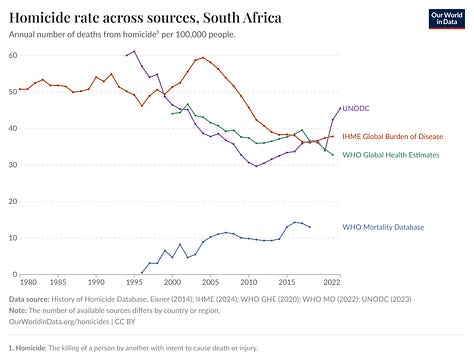

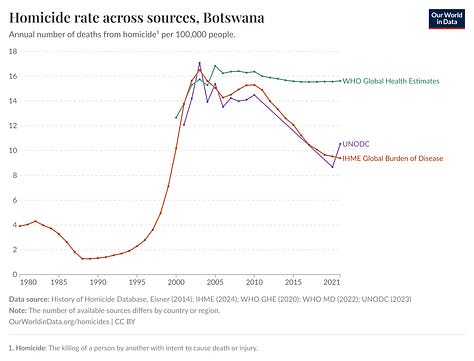
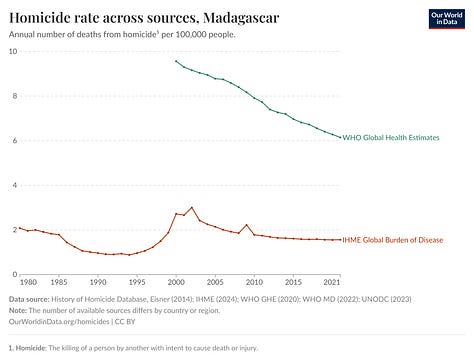
If you flip through, you’ll notice that 1) the South Africa lines don’t match the data Laird shared, 2) there’s huge uncertainty in all of these countries. But just taking a few salient points, here’s the approximate homicide rates:
You can see South Africa is unique. I don’t know why. It’s not just a record-keeping thing! Botswana keeps fine records! It’s evident that something truly bizarre is going on in south Africa, and it was already happening in 1980 before “necklacing” was a thing.
In general what I would say is that I think probably all of this data is junk, even the South African data. I suspect homicide rates at all periods here were and are way higher than the data shows. But I have no idea how much higher or how to interpolate it historically. But ultimately this is a non-issue: yes, Laird and I agree, the system of reciprocal violence engendered by the apartheid regime was a huge part of the problem!
Conclusion
Literally none of Laird’s points hold up. I mean, this is coming from the guy who thought that conservative opposition to abortion was invented in the 20th century and who thought that conservatives only started carrying about disabled people when it became a nexus for abortion politics, so the fact that literally all of his points here are incorrect is par for the course.
But what I will say is Laird is circling around a point I’ve made recurrently in this whole debate: the presence of highly capable elites in positions of influence really does matter. My view is the success cases in Africa are mostly cases where colonizers successfully transferred a range of legal, political, and institutional technologies. Where they could find indigenous stakeholders to continue using those technologies after independence (Botswana and Mauritius most conspicuously, but the book I linked above extends this even to places like Hong Kong, Singapore, different parts of India, and other cases in Africa and even the western hemisphere), those countries did okay. Where the technology transfer was interrupted by communism or civil war or whatever, governance suffered. Often but not always, white colonial elites were a vital link in the chain keeping the technologies operable post-independence. But there’s a radical difference between, “With a handful of really competent elites in technocratic roles, you can life the welfare of entire countries and keep it durably higher, and all while maintaining participatory democracy” and “If Zimbabwe had just had a few more whites it would have turned out fine.”
No! Zimbabwe would never turn out fine! The British did not transfer functional institutions of governance to Zimbabwe, but instead deputized clannish chieftains and empowered the very worst and most extractive kinds of elites. Whatever differences national IQ may play, they are going to be overwhelmed by the basic question of institutional transfer. On a PPP basis, Mauritius and Botswana are richer than some parts of Europe. Institutional quality is the greater arbiter. Underlying population IQ, and especially the prevalence of high-IQ individuals who believe cultural stories that motivate investment in quality institutions, may matter somewhat, but apart from its effects on institutional quality (which also has tons of non-genetic determinants), the effects appear to be small, at least within Africa.
Thus, I maintain that dysgenic fertility is no big deal. The relative decline of South Africa began under white rule, and even if leadership by minority whites was optimal for growth, apartheid was a massively suboptimal way to bring about that leadership. In countries where white minority leadership took a different form, outcomes were much better, and this is true regardless of national IQs.





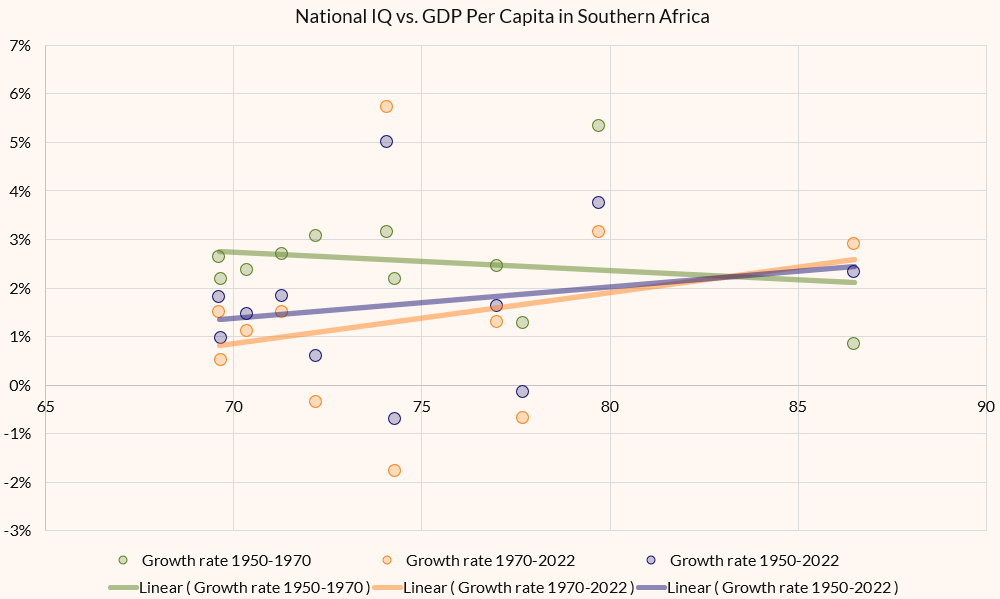

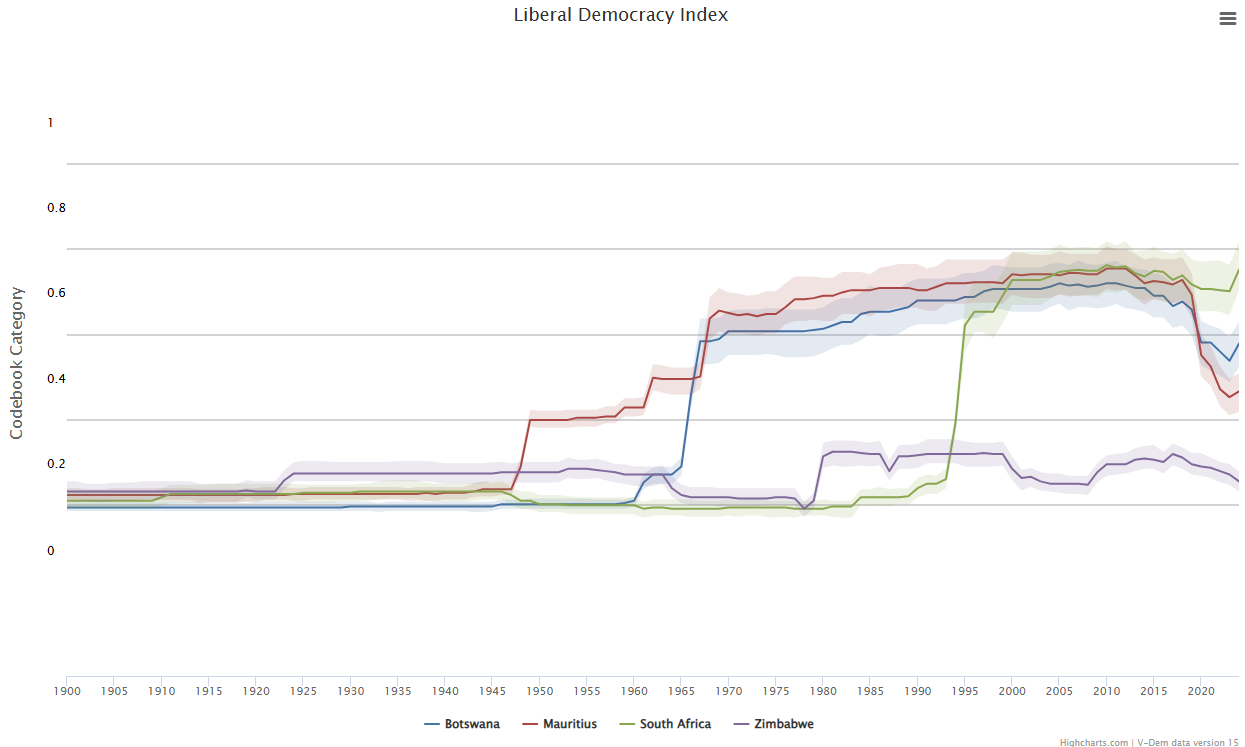



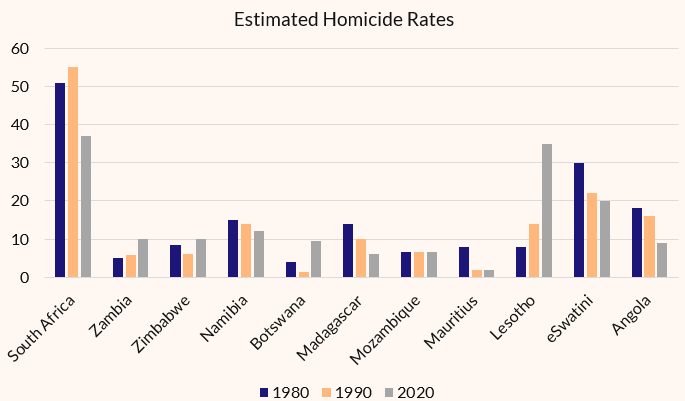
Botswana has a population of 2.4M.
Mauritanius, a tiny island not even in Africa, has just 1.2M people.
This doesn’t even add up to the number of people in Singapore. It represents just 0.2% or so of Sub Saharan Africa’s population.
These countries may have one of the highest resource/GDP ratios on the entire planet. Botswana is less than 10% as densely populated as South Africa. It’s a situation more akin to the UAE (an apartheid state with a higher population).
It’s great and all that they have managed to dig this shit out of the ground, sell it to westerners, and then pay the westerners to build and run a country for them, and not have a civil war. This was enough to get a middle income GDP/cap far below any western country, which is nice and all, but nothing special.
It’s also not remotely scalable or instructive. You can’t apply that model to the rest of Africa, because they don’t have the same resource per capita as these places. South Africa has 64 million people. If it wants to be rich, it needs high IQ middle class people actually creating value with their minds. It can’t be some resource niche or as a tax haven.
South Africa didn’t do anything to the international community to deserve sanctions. There was a moral panic where people decided that because of domestic politics in the west they were going to have a moral crusade against the people literally just trying to keep the lights on from the savage hordes.
Once blacks got political rights they did EXACTLY WHAT THEY DO EVERYWHERE. They did the same thing in Detroit, Baltimore, and Newark back in the USA.
Great piece. The 2024 Nobel Prize in Economics is a solid validation of the critical importance of institutions to development, and understanding institutions requires both dispassionate social choice theory as well as historicism.
Nice book recommendation too, as someone deeply interested in the mechanisms of economic development I look forward to reading Lineages of Despotism and Development